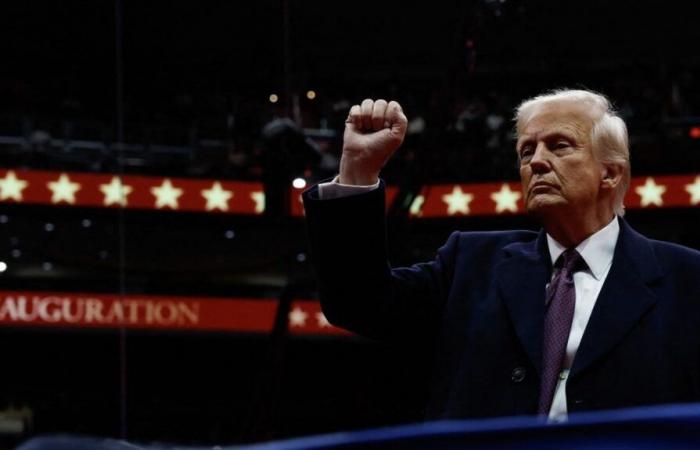Four years after the end of his first term, Donald Trump returns to the White House with the same objective: “Make America Great Again.” From his inauguration speech on Monday January 20, the American president promised to restore the“golden age” of his country and reaffirmed his trade war threats.
“Instead of taxing our citizens to enrich other countries, we will impose tariffs and taxes on foreign countries to enrich our citizens”launched the Republican. Which countries are in Donald Trump's sights? What weapons is he brandishing? We take stock of the battle plan for the new tenant of the White House.
By threatening to impose tariffs on Canada and Mexico
Just invested, Donald Trump opened the front of the trade wars by reiterating, on Monday, his desire to impose customs duties of 25% on products coming from Canada and Mexico, from February 1. For the moment, no decree has formalized this measure. But, during his campaign, the billionaire affirmed that he would quickly introduce customs duties on all products coming from these two border countries, if they did not curb the entry of drugs and illegal migrants into the United States. .
Canada and Mexico are however theoretically protected by a free trade agreement with the United States, renegotiated in 2018 during Donald Trump's first term and which he then presented as the “best possible”. Furthermore, the two countries being among the Washington's main trading partners, some Experts expect that an increase in customs duties will lead to a rebound in inflation. A prospect that the new president's administration dismisses. American companies also anticipate retaliation from the countries concerned in the form of additional customs duties, which would penalize their own exports.
For its part, Canada, of which 75% of exported goods and services go to the United States, sees in these advertisements a “very real threat.” Canadian Prime Minister Justin Trudeau promises that the country “repostera” if Donald Trump carries out his threats. According to Scotiabank projections, cited by -, a trade war between the two countries could cause Canadian GDP to fall by more than 5%, increase unemployment and cause inflation to rise. The President of Mexico, Claudia Sheinbaum, for her part called for keeping “a cool head” and to “stick to signed decrees” by the American president, “beyond the speech”.
By putting pressure on China again
During his campaign, the billionaire also threatened to significantly increase customs duties on imports from China, not ruling out the possibility that they could reach 60% or even more. Questioned by the press at the White House on Tuesday, Donald Trump assured that his government was finally discussing “10% customs duties on Chinese products because they send fentanyl to Mexico and Canada.” “It’s probably for February 1st, that’s the date we’re looking at,” he added.
Beijing reacted on Wednesday by claiming to be “firmly determined” has “defend its national interests”. “We have always believed that there are no winners in a trade war or a tariff war”said Mao Ning, a spokesperson for the Chinese Foreign Ministry.
During his first term, Donald Trump had imposed high tariffs on Chinese imports, measures essentially maintained by his successor, Joe Biden. A further increase in customs duties would deal a heavy blow to the Chinese economy, whose growth remains largely dependent on exports. “In 2018-2019, Trump chose to tax only part of imports, around $300 billion, but now it could be much more”explains on franceinfo Antoine Bouët, professor of economics at the University of Bordeaux.
-According to the specialist, the United States would also have to lose by opening a new trade war with Beijing. “L“China still has a capacity for retaliation, in particular because it can close its market”notes Antoine Bouët. Which could have consequences for household wallets and for American businesses. These latter “bbenefit from intermediate goods, machines, electrical equipment which come from China and which are inexpensive”and response measures could “ruins” their competitiveness, warns the economist.
By calling on the EU to buy more American oil and gas
Donald Trump also placed the“energy emergency” at the heart of its priorities and intends to boost the exploitation of the country's hydrocarbons to reduce the cost of energy and fight against inflation. The American president wants to increase oil and gas production to “fill strategic reserves” et “exporting American energy around the world.”
On this aspect, the Republican particularly targets the European Union and criticizes its trade surplus with Washington. The Twenty-Seven “are tough, very tough. They don't buy our cars, nor our agricultural products, they buy almost nothing”he said Monday evening. “So we are going to solve this problem by imposing customs duties or by forcing Europeans to buy our oil (…) and our gas,” he continued.
In 2022, exports of goods from the EU to the United States amounted to 509 billion euros, while imports of American products to the Old Continent represented 358 billion euros, according to data from the Council of the European Union. The EU mainly sells medicines as well as motor vehicles to the US market. In exchange, it buys natural gas, oil and also pharmaceutical products from the United States.
Furthermore, the causes of this imbalance vary depending on the European countries. For example, the trade deficit with Germany is mainly industrial in nature. That with Ireland is largely linked to the installation on the island of the European headquarters of large American groups, which benefit from very advantageous taxation there to reduce their taxes. Donald Trump's campaign promises to reduce the corporate tax rate in the United States, in a logic of protectionism, are also worrying the territory.
Furthermore, while the EU certainly has a trade surplus “substantial” as far as goods are concerned, the Americans have a surplus on their side “substantial” on trade in services, reacted a spokesperson for the European Commission. The President of the European Commission assured Tuesday that the EU would show itself “pragmatic” with the United States, calling for “start the dialogue without delay” and to “prepare for negotiation”. At the beginning of November, Ursula von der Leyen had already raised the possibility that Washington would supply more liquefied natural gas to the EU to replace Russian gas.
According to a note analysis published by the bank Goldman Sachs in December, the imposition of customs duties of 10% would reduce the GDP of the euro zone by 1%. A shortfall that is difficult to envisage for the EU, already faced with a slowing economy and whose largest economy, Germany, is in recession. A potential trade conflict would have a “substantial economic cost to everyone, including the United States”, For his part, said the European Commissioner for the Economy, Valdis Dombrovskis.






